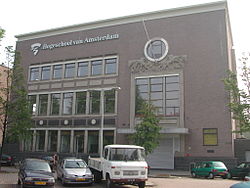Amstel Brewery(Dutch:Amstelbrouwerij[ˈɑmstəlbrʌuəˌrɛi]) is a Dutchbreweryfounded in 1870 on the Mauritskade inAmsterdam.It was taken over byHeineken Internationalin 1968, and the brewing plant closed down in 1982, with production moving to the mainHeinekenplant atZoeterwoude.
 | |
 Amstel Premium Lager | |
| Industry | Brewing |
|---|---|
| Founded | 1870 |
| Headquarters | , Netherlands |
Area served | Worldwide |
| Products | Beer |
Production output | 36 million litres |
| Owner | Heineken International |
| Website | amstel.com |



History
editThebrewerywas founded by Charles Antoine de Pesters (1842–1915), Johannes Hendrikus van Marwijk Kooy (1847–1916) and Willem Eduard Uhlenbroek (1839–1880). De Pesters and Van Marwijk Kooy were brothers-in-law, both coming from very affluent Amsterdam families. Uhlenbroek's father owned a small sugar refinery in Amsterdam. The brewery was named after theAmstelRiver. The brewery's symbolic first stone was laid on 11 June 1870. The first brew was completed on 25 October 1871 and2+1⁄2months later, on 9 January 1872, the first beer was delivered to clients. The brewery was officially opened on 15 January 1872.[1]At this time its annual brewing capacity was 10,000hectoliters(220,000 imp gallons). For the purpose of storing the beer, winter ice fromcanalswas kept in special double-walled cellars. Originally, Amstel beers were mostly drunk in Amsterdam. The expansion outside Amsterdam ran more or less parallel to the development of the Dutch railway network. Agents were appointed in towns along new railway lines. As from 1883, Amstel beers were also exported toGreat Britainand theDutch East Indies.In 1884 a special export bottling plant was built, where "tropical" beers for the Dutch East Indies and other overseas markets were pasteurised and packaged in metal kegs.
On 1 January 1891 the firm De Pesters, Kooy & Co. operating under the name Beiersch Bierbrouwerij De Amstel (Bavarian Beer Brewery De Amstel), was turned into a public limited company. In 1915 the production of Amstel had increased twenty-fold and in 1926, Amstel consisted of a third of the Dutch beer exports. In 1941, Amstel, together with Heineken, bought up the Amsterdam brewery Van Vollenhoven's Bierbrouwerij, which was closed in 1961.
In 1954, Amstel built a brewery inDutch Guiana.A few years later, Amstel was the first Dutch brewery to export beer incans.At this time, the total exports of Amstel beer amounted to 101,000 hectoliters. In 1958 a subsidiary of Amstel produced its first beer inJordan.In 1960, the third subsidiary of Amstel was opened inCuraçao.1963 saw the opening of two new breweries, one inPuerto Ricoand one inGreece.
Amstel was bought out byHeineken Internationalin 1968.[2]In 1972 the Amstel Brewery in Amsterdam was closed and production was relocated to the main Heineken plant inZoeterwoude.The building on the Mauritskade was torn down. Only the former administration building was kept and has since become part of theHogeschool van Amsterdam.
At the end of the 20th century, inSpain,Heineken Internationaldecided to replace the localcentennialbrandEl Águila and convert it into Amstel.[1]
Beers
editHeineken offers several beers under the Amstel brand.[3]Amstel Lageruses predominantly lightpilsnermalt,although somedark maltis also used. It is sold in 75 countries.Amstel Lightis a 3.5% Alcohol by Volume (ABV)pale lagersold in the USA and The Netherlands, a 2.5% ABV variant sold in New Zealand. In the United Kingdom Amstel Bier is 4.1% ABV, and 4.0% ABV in Mexico.Amstel 1870is a slightly dark 5% abv lager. InFrancea beer calledAmstel Free,with minimal alcohol content –about one per cent ABV– is produced. A non-alcoholic beer,Amstel Zero,can be purchased in the Netherlands, Greece, Egypt and few other countries.Amstel Ultra Lightis a beer made by Heineken Mexico for the Mexican market.
Amstel also markets ashandycalledAmstel Radlerin several countries. It contains 2% alcohol and it is a mix of lager beer and lemonade.[4]
References
edit- ^abPeter Zwaal,The history of De Amstel Brouwerij since 1870(Amsterdam: Bas Lubberhuizen, 2010) p.14-15.ISBN9789059372900
- ^Oliver Garrett,The Oxford Companion to Beer(Oxford: Oxford University Press, 2011) p.49.ISBN9780195367133
- ^Heineken Nederland
- ^"Brewers crafting shandy-style ales for (nearly) all seasons".Fortune.Retrieved2020-04-20.